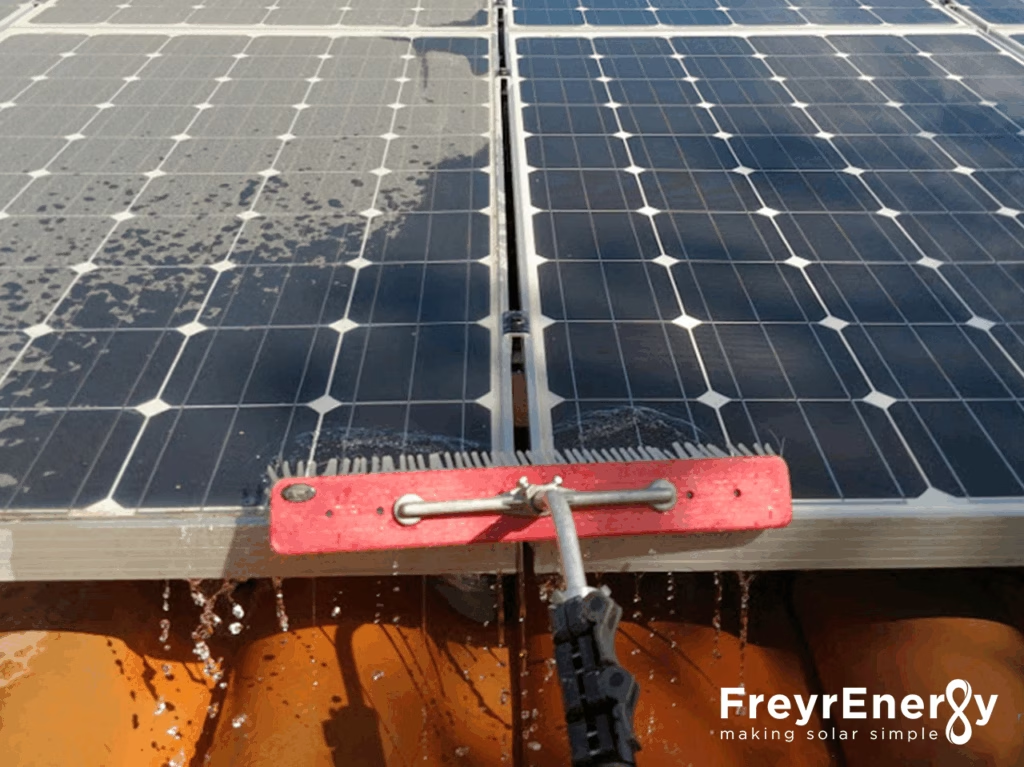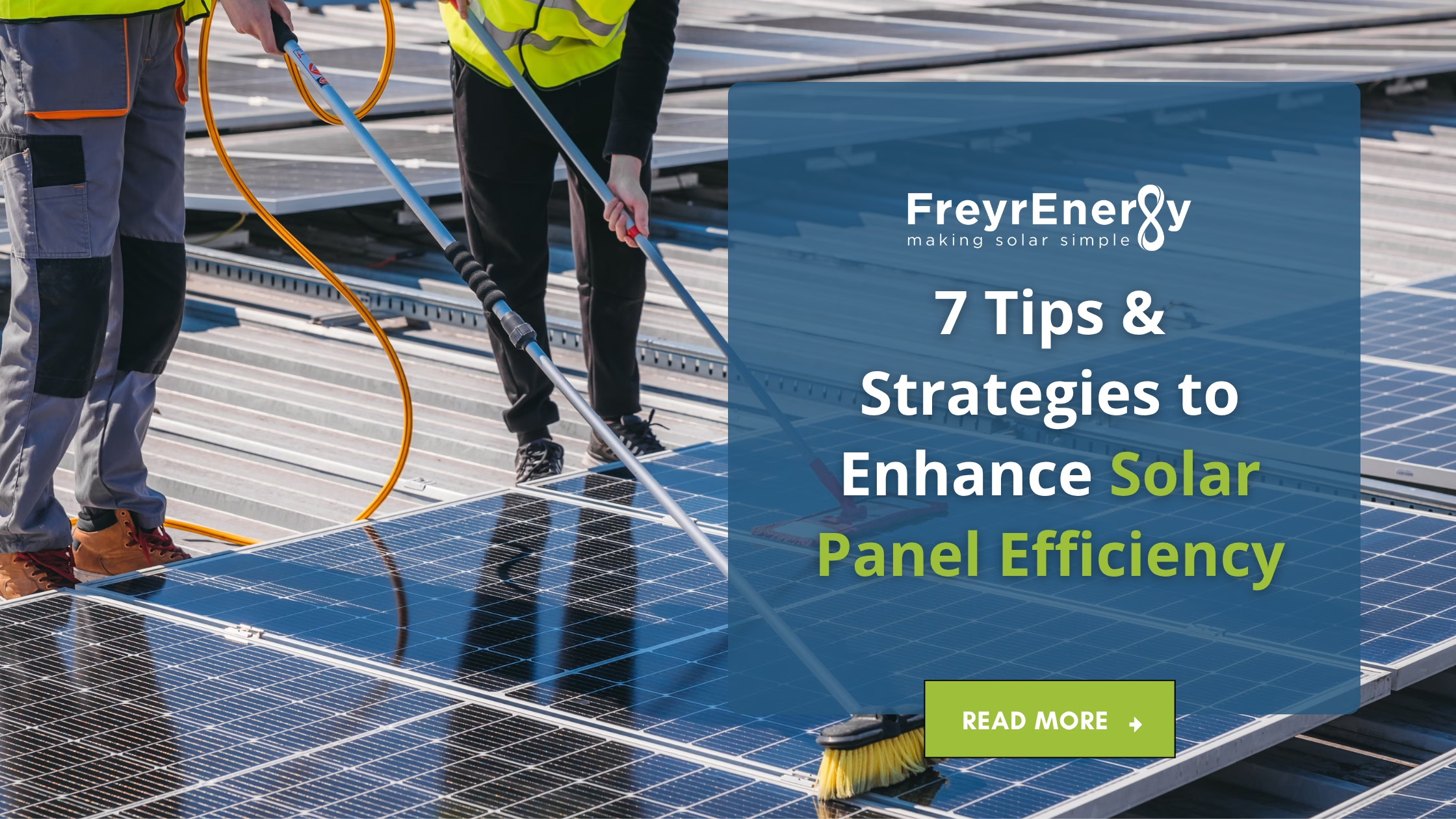Solar panels get a potential 30 percent energy yield loss per year if they are not cleaned every month.If your solar panels are covered in dust, filth, or grime, the output of your system may be diminished. This limits the efficiency as the sun gets blocked. Rain will be adequate to clean your solar panels as long as they are not placed entirely flat.
You may have greater dust coverage than the usual solar system if your panels are close to factories, busy highways, or farms, and the wind frequently blows dust at them. If you reside in a location where rainfall is scarce, manually clean your panels as dirt accumulates. Before and after it rains, keep an eye on your panels to see whether they’re clean.

How to Clean Solar Panels on Roof in India
Although natural rainfall will often wash away dust or dirt particles, you may need to assist it with your garden hose. When it rains, dirt accumulates at the bottom edge of the solar panel, clogging the lower PV cell row and limiting the production efficiency. Before solar panel washing, make sure your system is completely shut down according to the shutdown procedure outlined in your user handbook. Water should not be directed onto the back of your panels or into the space between them and your roof. Use a soft cloth and mild soap to remove stubborn dirt. You won’t need any special cleaning products or solar panel cleaners; just water and gentle soap will suffice. Detergent and abrasive powders should be avoided. Once every 6 months, cleaning with soap is suggested.
Solar panels cleaning with a hose or a pail of room-temperature water is the most effective method. Warm water should not be used in solar cleaning systems. In a similar way to how you would wash your automobile at home. When cleaning your solar panels, avoid using a high-pressure water sprayer. Solar panels can be damaged by a high-pressure attachment that discharges water at pressures more than 35 bar. Stains that solidify and adhere to the panel, such as bird droppings, should be removed as soon as possible. Make sure you don’t overclean your system. Weekly cleaning should be adequate unless there is a substantial amount of dust in your region.
Getting Rid of Tough Stains
If the self-cleaning solar panels are covered in hard-to-remove stains like a bird dropping, rain or a hose would not be sufficient. In such cases, you can use a cleaning tool. Make sure the brush you’re using is soft and clear of harsh bristles. Sponges are excellent for cleaning solar panels because they do not scratch them. If you opt to use a little solar panel cleaning soap on your sponge, be sure it’s something you’d use to clean your dishes with. Laundry detergents and other harsh chemicals may have a negative impact on your solar panels. Remember that in 99 percent of circumstances, pure water is the best option for a solar panel cleaning system.
Things to Keep in Mind for Solar Panel Cleaning
The combination of heated glass on your panels and chilly water might enhance the risk of cracking due to temperature fluctuation. Furthermore, if the panels are exposed to the scorching sun, the soapy water you’re using to clean the panels will evaporate fast, leaving a residue or smear on the panels that could reduce their effectiveness. The best time to clean solar panels is when it’s done in the early morning when it is cool. Dew that has accumulated on the solar panels overnight may have softened the filth and grime, requiring you to use less water and energy to clean them. If you can’t clean your solar panels early in the morning, a gloomy day or a nice, cold evening are also good options.
Frequently Asked Questions
For best results and top-notch performance, try to clean solar panels once every 6 months. The system has a great shelf-life and cleaning is recommended at least twice a year.
To some extent, rainwater is the best way to clean solar panels. However, there is a possibility of debris and dust particles sticking to regions where enough rainwater contact has not been made.
Solar panel washing is recommended early in the morning or sometime later in the afternoon when the intensity of sunlight is low.
Solar panels work efficiently when it’s serviced and are cleaned at regular intervals. Because with frequent cleaning, all the dust and debris that hinder the performance are removed. This solar panel cleaning service allows for great usability and efficient power generation.
Yes. Cleaning the panels at least twice a year helps the panel to give out efficient solar system performance. Always check if the generation is low and immediately cleaning solar panels on roof to see if the old performance is restored.
No. Never attempt to wash solar panels when they are hot. There is the possibility of the panels being damaged or experiencing thermal shock. This is why it is recommended to do solar cleaning service in the early morning or evening.
An average solar panel experiences a slump in power generation with dirt and debris stuck in the PV panels. This is how dirt alters the outcome of these panels.
Use soap in places that require removing stubborn dirt. Otherwise, use normal water and a soft cloth to clean the particles.
To clean solar panels on a roof, ensure safety by using appropriate gear and working during cool times like early morning. Use a soft brush or sponge with mild, soapy water to gently remove dust and debris. Avoid harsh chemicals and abrasive materials to prevent damage to the panels.



